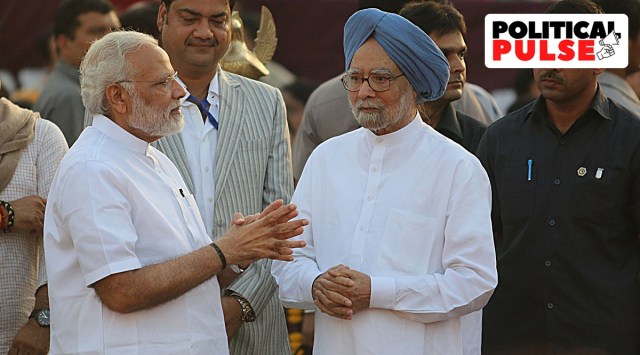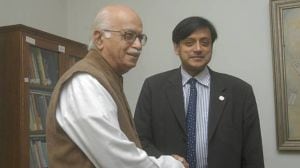‘Minorities have first rights to resources’: PM Modi cites speech he attacked Manmohan Singh for
Modi uses former PM's speech to target Rahul Gandhi's call for "jitni aabadi utna haq", asks whether Hindus as majority should corner most of the resources
 Modi referred to a speech made by Manmohan Singh during his first term as Prime Minister in 2006, and said: “He (Singh) used to say that minorities have the first right to the country's resources... But now the Congress is saying that the population of the community will decide who will have the first right to the country's resources...". (Express Photo by Tashi Tobgyal/File)
Modi referred to a speech made by Manmohan Singh during his first term as Prime Minister in 2006, and said: “He (Singh) used to say that minorities have the first right to the country's resources... But now the Congress is saying that the population of the community will decide who will have the first right to the country's resources...". (Express Photo by Tashi Tobgyal/File) Addressing a rally in poll-bound Chhattisgarh on Tuesday, Prime Minister Narendra Modi took on the Congress’s demand for a caste census, specifically Rahul Gandhi’s call for “jitni aabadi utna haq“, made during the Karnataka Assembly elections earlier this year.
Modi referred to a speech made by Manmohan Singh during his first term as Prime Minister in 2006, and said: “He (Singh) used to say that minorities have the first right to the country’s resources… But now the Congress is saying that the population of the community will decide who will have the first right to the country’s resources… Now do they (Congress) want to decrease the rights of the minority? Do they want to remove the minorities?… Should the Hindus, who have the largest population, come forward and take all their rights?”
What had Singh said?
At a Meeting of the National Development Council in December 2006, where Chief Ministers of all states were present, Singh spoke on the approach paper to the 11th Five Year Plan and addressed the “potentialities and inherent strengths of our economy, while also addressing the areas of concerns”.
He said we needed “faster growth” because “we must expand the production base of the economy if we want to provide broad-based improvement in the material conditions of living of our population”.
“We will have to devise innovative plans to ensure that minorities, particularly the Muslim minority, are empowered to share equitably in the fruits of development. They must have the first claim on resources.”
– Dr Manmohan Singh, 9th Dec, 2006
The least Congress can do is… https://t.co/20rwAWX2va pic.twitter.com/Vvc0Sm3OzB
— BJP (@BJP4India) October 3, 2023
https://platform.twitter.com/widgets.js
However, Singh said, the growth process needed to be “inclusive”. He underlined “a growth process that raises incomes of the poor to bring about a much faster reduction in poverty, a growth process which generates expansion in good quality employment, and which also ensures access to essential services such as health and education for all sections of the community”.
The former PM went on to highlight the approach paper’s “monitorable socio-economic targets relating to employment generation, school dropout rates, infant mortality rates, maternal mortality rates and other important indicators”.
He said, “I believe our collective priorities are clear. Agriculture, irrigation and water resources, health, education, critical investment in rural infrastructure, and the essential public investment needs of general infrastructure, along with programmes for the upliftment of SC/STs, other backward classes, minorities and women and children.”
Then he made the statement that Modi was referring to Tuesday. “The component plans for Scheduled Castes and Scheduled Tribes will need to be revitalised. We will have to devise innovative plans to ensure that minorities, particularly the Muslim minority, are empowered to share equitably in the fruits of development. They must have the first claim on resources. The Centre has a myriad other responsibilities whose demands will have to be fitted within the over-all resource availability. The Planning Commission will of course undertake a thorough review of ongoing programmes to eliminate those which have outlived their original rationale, but we cannot escape from the fact that the Centre’s resources will be stretched in the immediate future and an increasing share of the responsibility will have to be shouldered by the states.”
What followed
At the time the Gujarat Chief Minister, Modi said: “Such a statement does not behove a senior leader like the Prime Minister. It is unfortunate.”
Shivraj Singh Chouhan, then too the Madhya Pradesh CM of the BJP, called the PM’s statement “inappropriate” and “dangerous”; then Chhattisgarh CM Raman Singh of the BJP said that economic backwardness should be the sole criteria for programmes.
RSS leader Ram Madhav said, “It is unfortunate our leaders have not learnt lessons from the tragic Partition. They are pursuing the same politics of religion for electoral benefits.”
Rajnath Singh, who was the BJP chief at the time, called Singh’s comments “appalling”.
In a press release a day later, the Prime Minister’s office said there was a “deliberate and mischievous misinterpretation” of Singh’s words. “…Observations have also been quoted out of context in some sections of the electronic media, fuelling a baseless controversy,” it said.
The release said the PM’s reference to “first claim on resources” refers to all the “priority” areas “including programmes for the upliftment of SCs, STs, OBCs, women and children and minorities”.
“While better off sections of society will benefit from this process, it is the responsibility of the Government to pay special attention to the welfare of weaker and marginalised sections. The Prime Minister has said on several occasions that ‘India must shine, but shine for all’,” it said.



- 01
- 02
- 03
- 04
- 05




























